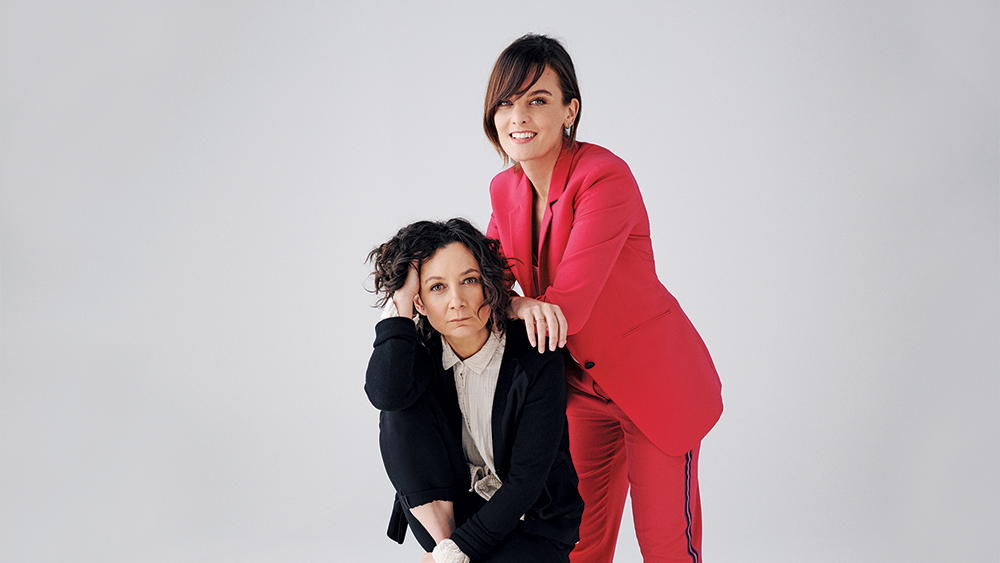Frankie Shaw Tells Sara Gilbert That ‘SMILF’ Was Inspired by ‘Roseanne’
By Debra Birnbaum
LOS ANGELES (Variety.com) – This interview was conducted at the end of April, several weeks before “Roseanne” was canceled following a racist tweet by Barr. In response, Sara Gilbert tweeted, “This is incredibly sad and difficult for all of us, as we’ve created a show that we believe in, are proud of, and that audiences love — one that is separate and apart from the opinions and words of one cast member.”
Frankie Shaw:
“Roseanne” is and was so important to so many people, and I can say “SMILF” is directly inspired by growing up watching “Roseanne” and seeing people who felt like my family on television. I was like, “Oh, those people speak to each other like how my family speaks to each other,” you know, with sarcasm.
: And I felt watching “,” I was thinking this is so amazing that this character is struggling, doesn’t have money, it’s difficult to buy things. Even when people are portrayed as working class on TV, you don’t usually see the real struggle.
Shaw: What is different in filming this new season of “Roseanne”? Are you dealing with different issues?
Gilbert: I never go in thinking these are the issues that we want to take on, but it is just a way to talk about things that we’re experiencing right now through the lens of this family. So we got to talk about how people are divided politically without it being about anyone’s politics specifically, just about how does a family deal with this conflict. Or my son likes to wear skirts and more feminine clothing, so how does that affect the family relationship or how they treat him. I always think our writers do such a great job of doing things that are in current events without making it feel like we’re doing an issue. And I thought you did the same thing honestly with sexual harassment issues between men and women, and power, and just a woman’s place in the world. Was that the main reason you wanted to make this story?
Shaw: Yeah, there was sort of a layered approach while writing “SMILF.” On the surface, what it’s like to be broke and raising a kid and navigating co-parenting, and then underneath that, I wanted to explore feminine identity and the issues we all face. It wasn’t like, oh, how do we directly make this a feminist show. It’s really just like, what is life like for me and other women, who are harassed, who have been sexually abused, who have to deal with objectification or their own identity.
Gilbert: How much of your life influences the show?
Shaw:
The way we like to talk about Bridgette is she’s a very exaggerated version of Frankie. We didn’t call the show Frankie for a reason. When we’re stuck in the writers room, what is a true story we can tell here? It always comes back to a kernel of truth. So that’s important to us, but because we want to talk about certain issues, we make Bridgette the butt of the joke. So on one hand, she’s very similar to me, and then also a huge departure and very exaggerated and a lot messier. But there are elements of myself from a long time ago when things were really difficult, when my son was younger, when I was struggling with an eating disorder and residual effects of trauma, that we put into this show very much deliberately.
Gilbert: And she is very flawed and can be sort of self-centered and antihero in some ways. Do you feel like the ways that she’s flawed are the same flaws that you either have or had back then?
Shaw:
Yeah, when we’re talking about her in the writers room, we say Bridgette can’t be woke. She hasn’t read the books or had the conversations, so that’s something that felt really important. I’m not claiming to be woke, but I’m trying to be as educated as possible. What about you and Darlene? What’s true about you, and what’s true about the character?
Gilbert: I think over time since I played Darlene originally, I probably have gotten more vulnerable and gotten older so I’ve gone through more hard knocks, and I think I wanted to bring that to Darlene, that kind of humanity so she can still have a sharp tongue and have a tough side but a little wear on the wheels, you know? I wanted to bring that feeling to her.
My goal in general, in any project, is to want to tell people’s stories and have them relate. I think in order to do that, I feel like I have to bring a chunk of myself, probably what you’re saying about being in the writers room and wanting real stories. So in that way, I think we’re the same. I’ve always thought Darlene was a little stronger than me. She just has this fire and this strength that maybe I have, but maybe you just don’t feel it when it’s you. Not when I’m playing it, but I can later watch her on the screen and see this kind of inner strength.
RELATED CONTENT:

